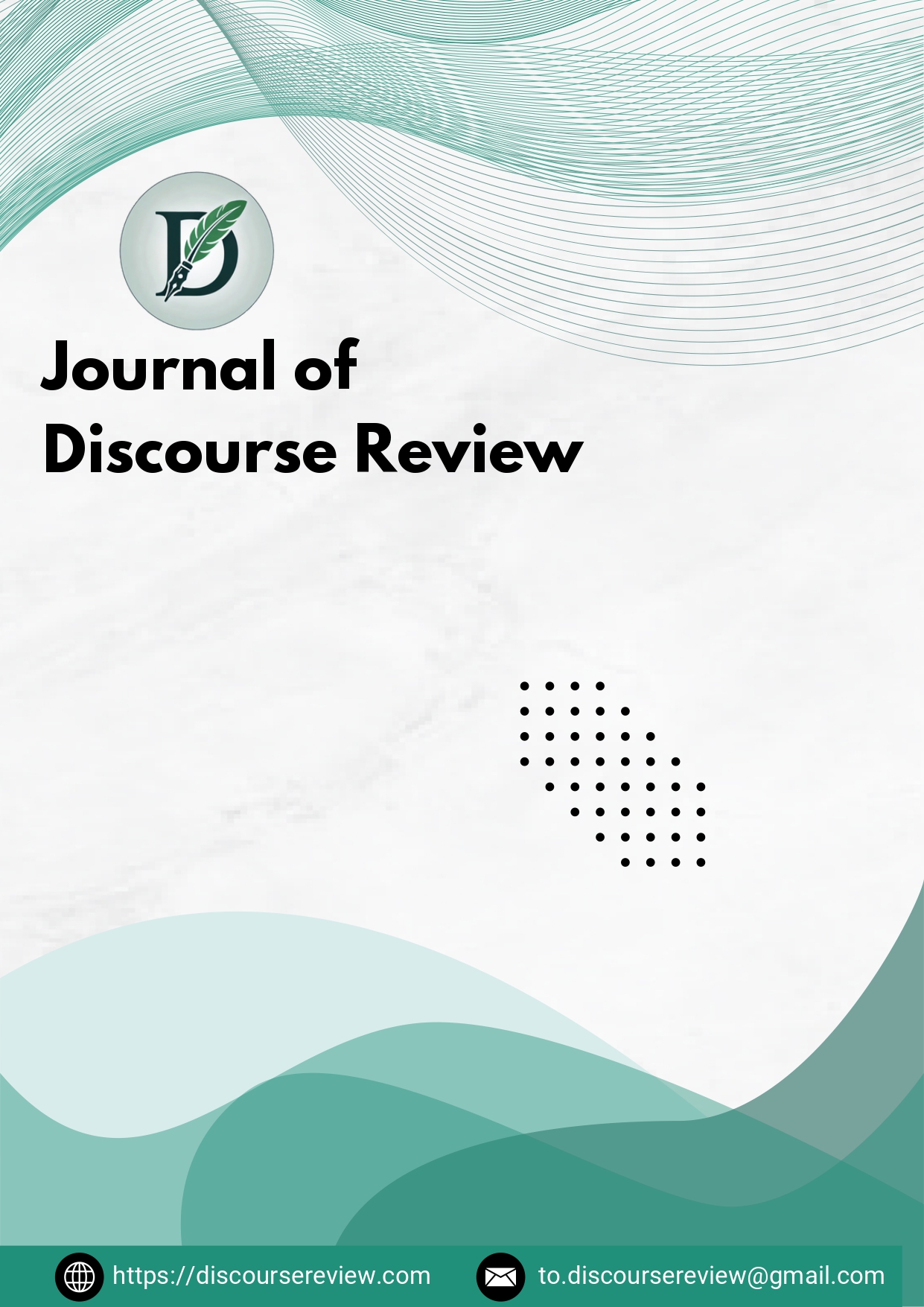
Journal of Discourse Review
Open Access Humanitarian Scholarship
7 days
Time to first decision

Open Access Humanitarian Scholarship
Time to first decision
Volume: 1 Issue: 1
Year: 2025, Page: 109-119,
Received: Feb. 25, 2025 Accepted: March 19, 2025 Published: April 22, 2025
Language is a vital component of cultural identity, shaping and conveying a community’s customs, values, and social structures. The mother tongue serves as a primary medium for expressing emotions, thoughts, and cultural nuances, while fostering individual identity and a sense of belonging. Far beyond a communication tool, language is central to cultural heritage, social cohesion, and collective memory. However, globalisation and linguistic homogenisation increasingly threaten this diversity, eroding not only cultural identity but also unique knowledge systems and indigenous worldviews embedded in regional languages. This paper argues that preserving and promoting mother tongues is essential not only for sustaining cultural and individual identities but also for safeguarding epistemological diversity in the face of global cultural flattening. The findings emphasise that preserving one's mother tongue is essential and imperative for maintaining cultural diversity and supporting individual identities. By taking concrete steps such as including regional languages in education, increasing resources, conducting awareness campaigns, and collaborating with the private sector, we can promote regional languages, arts, and culture while preserving and promoting India's rich cultural heritage
Keywords: Mother tongue, culture, identity, heritage, language preservation.
Abbate, C. E. (2016). “Higher” and “Lower” Political Animals: A critical analysis of Aristotle’s account of the political animal. Journal of Animal Ethics, 6(1), 54–66. https://doi.org/10.5406/janimalethics.6.1.0054
Baglione, J. M. (2017, November 9). Preserving a culture, one speaker at a time. Harvard Gazette. https://news.harvard.edu/gazette/story/2017/11/yuchi-language-project-seeks-to-revitalize-indigenousidentity-through-common-tongue/
Bose, S. (2025, February 19). CEO speaks: Power of mother tongue—Learning, expression & identity. Millennium Post. https://www.millenniumpost.in/k-reers/ceo-speaks-power-of-mother-tongue-learningexpression-identity-599465
Coleman, H. (2011). Allocating resources for English: The case of Indonesia's English medium International Standard Schools. In H. Coleman (Ed.), Dreams and realities: Developing countries and the English language (pp. 89–113). British Council. https://www.researchgate.net/publication/313576556_Allocating_resources_for_English_The_case_of_Indonesia's_English_medium_International_Standard_Schools
Crystal, D. (2012). English as a global language (2nd ed.). Cambridge University Press. https://doi.org/10.1017/CBO9781139196970
Daniel, B. (2024, February 28). Investigating and preserving Quechua. MIT News. https://news.mit.edu/2024/investigating-and-preserving-quechua-0228
Department of Official Language, Ministry of Home Affairs, Government of India. (2020). Home. https://rajbhasha.gov.in/en
Dosmambetova, M. A. (2025). The impact of English on local languages. Science and Education, 6(1), 245–248. https://openscience.uz/index.php/sciedu/article/view/7421/6800
Drishti IAS. (2023). The heart of culture: Preserving mother language. https://www.drishtiias.com/blog/theheart-of-culture-preserving-mother-language
Gandhi, M. K. (1953). Towards new education (B. Kumarappa, Ed.). Navajivan Publishing House. https://www.mkgandhi.org/ebks/towards-new-education.pdf
Hasnain, S.I. & Sarkar, I. (2025, April 1). Why India needs a clear national language policy. Outlook India. https://www.outlookindia.com/culture-society/why-india-needs-a-clear-national-language-policy
Karimnia, A. (2012). [Review of the book Language and identity: An introduction, by J. Edwards]. Canadian Journal of Linguistics/Revue canadienne de linguistique, 57(1), 159–162. https://doi.org/10.1017/S0008413100002267
Kramsch, C. (2014). Language and culture. AILA Review, 27(1), 30–55. https://www.jbeplatform.com/docserver/fulltext/aila.27.02kra.pdf?expires=1744974701&id=id&accname=guest&checksum=96CC08237333914DE93FDA7825F7D237
May, S. (2005). Language rights: Moving the debate forward. Journal of Sociolinguistics, 9(3), 319–347. https://doi.org/10.1111/j.1360-6441.2005.00295.x
Mubina, M. (2025, March 18). English & native language: Finding a balance in education. IQRO Indexing, 14(2), 665–668. https://worldlyjournals.com/index.php/IFX/article/view/9635
Native Tribe Info. (2022). Impact of Globalization on Indian Tribal Languages. Retrieved from https://nativetribe.info/impact-of-globalization-on-indian-tribal-languages/
Porecha, M. (2025, March 10). What does NEP, 2020 state about languages? | Explained. The Hindu. https://www.thehindu.com/news/national/what-does-nep-2020-state-about-languagesexplained/article69310722.ece
Prasad, S. (2023, August 21). Mother tongue: A lifeline to identity, culture, and connection in the modern world. Times of India Blogs. https://timesofindia.indiatimes.com/blogs/betweenus/mother-tongue-a-lifeline-toidentity-culture-and-connection-in-the-modern-world/
Press Trust of India. (2022, December 24). Education in mother tongue will increase students' ability to think, reason, analyse: Amit Shah. The Times of India. https://timesofindia.indiatimes.com/india/education-inmother-tongue-will-increase-students-ability-to-think-reason-analyse-amit-shah/articleshow/96479021.cms
Psychologs. (2023, October 22). Why are human beings called social animals? https://www.psychologs.com/why-are-human-beings-called-social-animals
Saini, M. (2025, February 14). Essay on importance of mother tongue – 10 lines, short and long essay. FirstCry Parenting. https://parenting.firstcry.com/articles/gen-essay-on-importance-of-mother-tongue-10-linesshort-and-long-essay/
Singh, A. P., & Imtiaz, S. (2022). The impact of digital divide in rural and semi-urban schools in U.P. International Journal of Innovations in TESOL and Applied Linguistics, 8(1), 25–33. https://www.ijital.org/images/issues/current-issues/issue-8th-2022/Paper-4.pdf
Statista. (2025, April 14). The most spoken languages worldwide. Statista. https://www.statista.com/statistics/266808/the-most-spoken-languages-worldwide/
The Japan Times. (2022, February 21). Efforts underway to save Ainu language and culture. https://www.japantimes.co.jp/2022/02/21/special-supplements/efforts-underway-save-ainu-languageculture/
UNESCO. (2021, November 23). Recommendation on the ethics of artificial intelligence. https://www.unesco.org/en/articles/recommendation-ethics-artificial-intelligence
UNESCO. (2023, April 22). Why mother language-based education is essential. https://www.unesco.org/en/articles/why-mother-language-based-education-essential
UNESCO. (2024, February 22). Multilingual education: A key to quality and inclusive learning. https://www.unesco.org/en/articles/multilingual-education-key-quality-and-inclusive-learning
Urbaite, G. (2024). The impact of globalization on cultural identity: Preservation or erosion? Global Spectrum of Research and Humanities, 1(1), 3–13. https://gsrh.net/index.php/home/article/view/31
Voce, A., Cecco, L., & Michael, C. (2021, September 6). ‘Cultural genocide’: The shameful history of Canada’s residential schools – mapped. The Guardian. https://www.theguardian.com/world/nginteractive/2021/sep/06/canada-residential-schools-indigenous-children-cultural-genocide-map
Zeelenberg, R., Pecher, D., Van Der Meijden, M. E. M., Trott, S., & Bergen, B. (2024). Non-native language comprehenders encode implied shapes of objects in memory. Cortex. https://doi.org/10.1016/j.cortex.2024.09.008
Zeeshan, M. (2025). Mother Tongue–Based instruction in Pakistani print media: Implications for language policy and Epistemic Inclusion. International Journal of Applied Linguistics. https://doi.org/10.1111/ijal.12715
Zeydanlıoğlu, W. (2012). Turkey's Kurdish language policy. International Journal of the Sociology of Language, 217, 99–125. https://doi.org/10.1515/ijsl-2012-0029
© 2025 JDR Academic Trust. This is an open-access publication distributed under the terms of the Creative Commons Attribution 4.0 International License (CC BY 4.0). https://creativecommons.org/licenses/by/4.0/
Vishnu, P., Afroj, S., & Ahmad, M. (2025). Mother Tongue as a Cultural Anchor: Identity, Heritage and Language Preservation. Journal of Discourse Review, 1(1), 109-119.